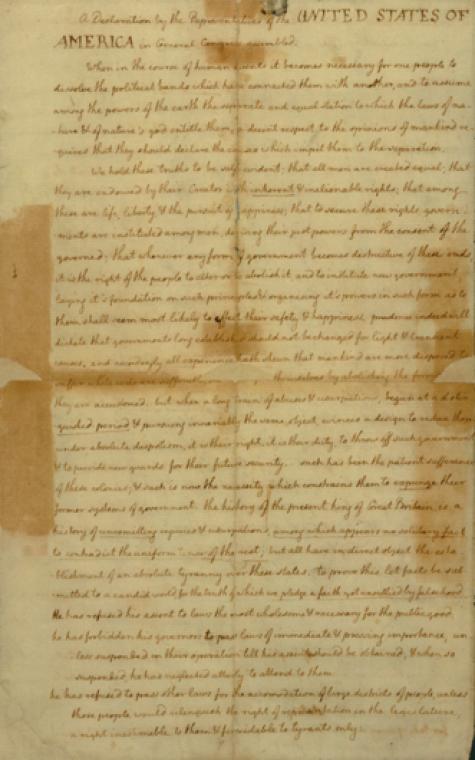Wythe's Lost Papers
|
Timeline for Wythe's Papers |
|
Before his death in June, 1806, George Wythe made no special instruction as to what should become of his personal papers and correspondence (if indeed he kept any). His last will and testament, dated April 20, 1803 (with later codicils), name his friend and neighbor William DuVal as executor, with allowances for his servants Lydia Broadnax and Michael Brown. He gives "Thomas Jefferson my silver cups and gold headed cane, and to my friend William Duval my silver ladle and table and teaspoons." To Thomas Jefferson he also wills "my books and small philosophical apparatus... the most valuable to him of any thing which i have power to bestow."[1]
No great cache of papers or correspondence appeared after Wythe's death, though Jefferson says (or assumes) that there were papers.[2] Wythe's notebook of Greek vocabulary from the Iliad ended up in the possession of John Page, Sr. (though when exactly this exchange took place is unclear). Wythe's lectures from time as Professor of Law & Police at the College of William & Mary survived in manuscript, as well as drafts of the Declaration of Independence and Constitution for Virginia, which Jefferson had sent to Wythe in 1776. These drafts were transcribed and printed shortly after Wythe's death in Thomas Ritchie's Richmond Enquirer. DuVal loaned the documents to Ritchie for publication, along with Wythe's lecture notes from his time as professor of law. Ritchie wrote to Governor William Cabell in 1807, returning "valuable papers," presumably the Jefferson manuscripts.[3]
Governor John Tyler, Sr., however, wrote to Jefferson in 1810, to say that Ritchie was still in possession of Wythe's lectures. Jefferson politely refused to take possession of the manuscript, though he seemed surprised that Wythe had not destroyed the notes, "as I expect he has done a very great number of instructive arguments delivered at the bar, and often written at full length." His instructions were that the notes should "go, with his other papers to his executor," Major DuVal. Judge Spencer Roane, Wythe's former student, is suggested as one who could "send them to posterity," but this is the last time mention of the lecture notes appear.

Wythe's manuscript copies of the Virginia Constitution and Declaration of Independence later came into the possession of Cassius Francis Lee, Jr., Esq. (1844–1892),[4] of Alexandria, Virginia, in the late nineteenth century, although how Lee obtained them is unclear. In his preface to Lee of Virginia, 1642-1892, Edmund Jennings Lee says of his brother, Cassius:
"From his earliest boyhood the late Cassius F. Lee, Jr., evinced a passion for genealogical research, and during the many years he continued his investigations he had collected a large amount of original data, consisting of letters, wills, deeds, and such like records. in 1870, with the assistance of Mr. Joseph Packard, Jr., of Baltimore, he published in the New England Genealogical and Historical Register a brief 'Record of the Descendants of Colonel Richard Lee of Virginia.' This publication was merely tentative, with the hope of procuring additional information that would enable him to compile a complete family history at a later date. In this hope he was disappointed; little or no data were obtained. But Mr. Lee continued his personal efforts, and had secured considerable additions to his collection, when his untimely decease ended his work."[5][6]Wythe's Illiad notebook was donated to the Virginia Historical Society by John Page, Jr., in 1934. It is unknown what became of Wythe's lecture notes, despite scholars Hemphill and Kirtland's attempts to track them. Both Worthington C. Ford and Paul L. Ford credit Cassius F. Lee, Jr. with providing them access to Jefferson's manuscripts of the Constitution of Virginia and Declaration of Independence, which now (evidence strongly suggests) reside at the New York Public Library's
- ↑ George Wythe, Last Will and Testament with Codicil, June 11, 1806, Thomas Jefferson Papers Series 1, General Correspondence, 1651-1827, Library of Congress.
- ↑ Jefferson to Governor John Tyler, Sr., November 25, 1810.
- ↑ H.W. Flournoy, ed., Calendar of Virginia State Papers, vol. 9 (Richmond, VA: 1890), 511.
- ↑ Not to be confused with his father, Cassius F. Lee, Sr. (1808 – 1890), also a lawyer. Edmund Jennings Lee, Lee of Virginia, 1642-1892: Biographical and Genealogical Sketches of the Descendents of Colonel Richard Lee, (Philadelphia: Franklin Printing Co., 1895), 474.
- ↑ Lee, Lee of Virginia, 3.
- ↑ These sentiments are reiterated in a footnote to a letter Cassius Lee wrote to Jefferson Davis on July 18, 1888 (printed in Dunbar Rowland, Jefferson Davis, Constitutionalist] [New York: J.J. Little & Ives, 1895], 10:76), asking if Davis might give him an original copy of a letter from his relative, Robert E. Lee:
Cassius Francis Lee, Jr. was born at Alexandria, Va., the 4th. day of January, 1844.
He was prominent in the civic, business and religious life of the city, and took a particular interest in all that pertained to the history of the old families of Virginia, collecting wills, deeds, letters, and all manner of genealogical data—Had his life been spared he would have arranged his papers for publication and would have edited a most admirable book.
He died Sept. 4th., 1892.